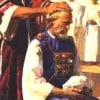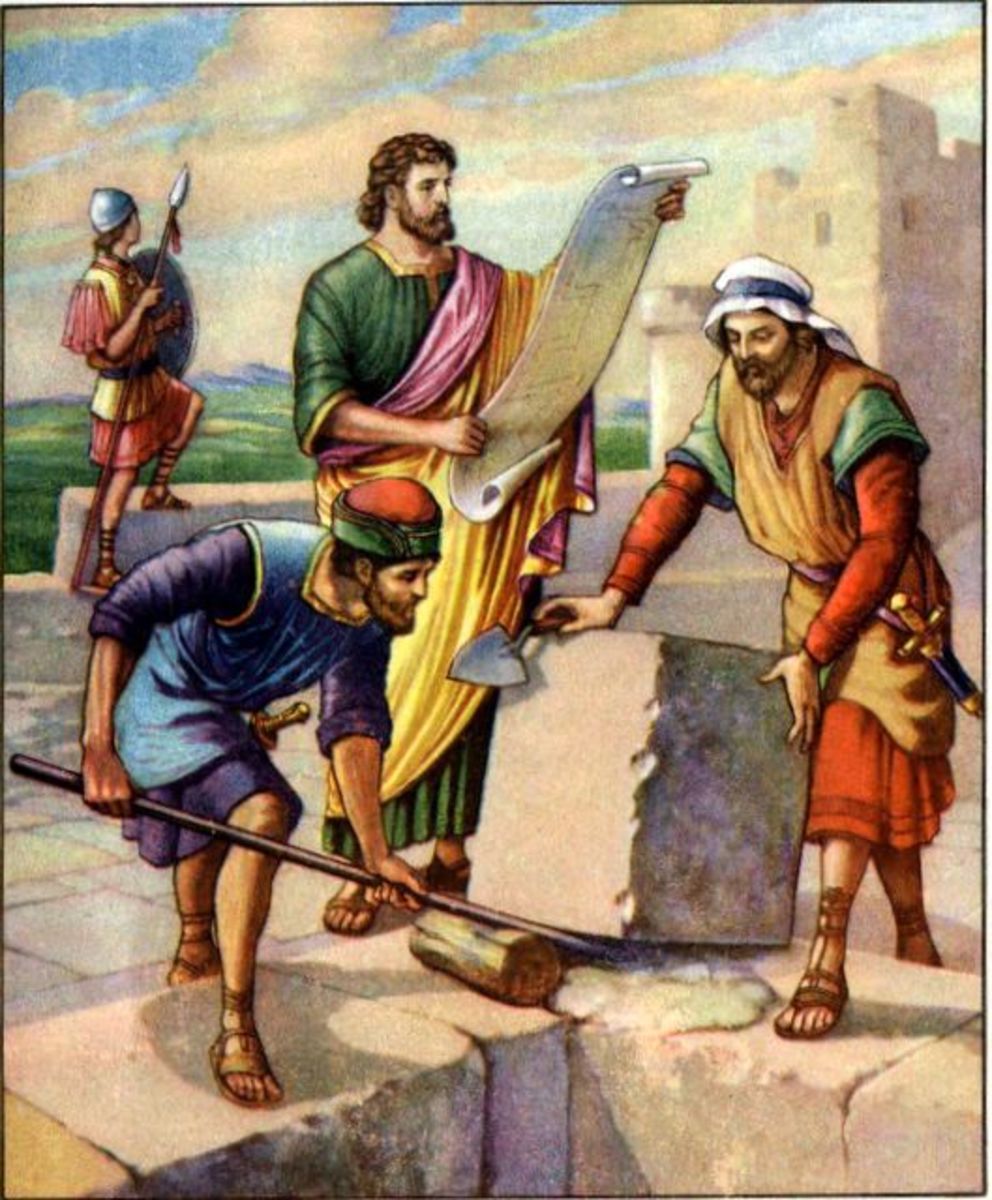Karaite Comments: The Truth About Chanukah
One of the more frequent questions that I'm faced with is why don't I believe in Chanukah? And as I try to explain, it is not an issue in believing in the holiday per se, the issue is with how it was presented and foisted upon the unwitting Jewish population. You see, Rabbanites believe that Chanukah is an ordained holy day, sanctioned by God and an essential part of the belief system. It is indoctrinated from youth, children playing with the dreidel so that by the time they become adults there is the false assumption of some great miraculous victory and magic oil burning in lamps. The Rabbis have gone as far as having the children and adults recite blessings that specifically make reference to God instructing us to light the candles of the Chanukah menorah. Once again the Rabbi's have perpetrated the grievous act of placing words in God's mouth that were never uttered. And may I once again remind everyone, to do so is to use God's name in vain. Any time that one instructs another to perform a certain act because they claim it is the will of God, and it is obviously not the will of God, then that perpetration of intentional falsification is a sin. And since it is a sin against the Decalogue, as the rabbis are well aware, it would be classified as one of the ultimate sins a man could do. But in answer to the original question, I do believe in Chanukah and I do celebrate it, but not in the way the Rabbanites do, and certainly not as a miraculous holy day that is part of my religious requirements to perform as a blessing. In fact my Chanukah is somewhat of a more sombre occasion. It is a dedication to the memory of up to 80,000 men, women and children that either died or were enslaved as a result of the politics of the time. So in essence, the candles are lit as a Yizkor to honour the dead, and their are no recitations of blessings proclaiming that God instructed me to do so since this was neither a war of liberation, nor a war in the defense of God. Should anyone bother to research the history they would quickly realize this was more a civil war than one between nations and even after the so-called liberation, Judea was still a satrapy under the dominion of the Seleukid Empire but the only thing different was it now had its own king. And more than that, a king that was not even entitled to assume that position. So let's get it straight; Chanukah had less to do with the assertion of religious freedoms and more to do with politics, politics, and more politics. But since most aren't familiar with the history, let me provide it to you.
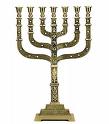
Eight Days of Light
Prior to addressing the history of the politics of the time, it is important that I impart an appreciation of the lack of any miracle concerning the menorah burning for eight days. Although this superficially would seem unbelievable as a pot of refined olive oil would be consumed quite rapidly, needing replenishing on a daily basis, the absurd part is why anyone believed the rabbinical account which assumes they were burning normal vegetable oil. As you will recall, they went searching through the Temple to find oil and only after an extensive look through all the hidden chambers did they find a single barrel of oil. But one should have asked, what oil would they have found concealed in these chambers? The answer has always been there. Not concealed, not hidden, but in plain sight in Maccabees 2. It reads as follows:
19 For when our fathers were being led captive to Persia, the pious priests of that time took some of the fire of the altar and secretly hid it in the hollow of a dry cistern, where they took such precautions that the place was unknown to any one. 20 But after many years had passed, when it pleased God, Nehemiah, having been commissioned by the king of Persia, sent the descendants of the priests who had hidden the fire to get it. And when they reported to us that they had not found fire but thick liquid, he ordered them to dip it out and bring it. 21 And when the materials for the sacrifices were presented, Nehemiah ordered the priests to sprinkle the liquid on the wood and what was laid upon it. 22 When this was done and some time had passed and the sun, which had been clouded over, shone out, a great fire blazed up, so that all marveled. 23 And while the sacrifice was being consumed, the priests offered prayer -- the priests and every one. Jonathan led, and the rest responded, as did Nehemiah.
24 The prayer was to this effect: "O Lord, Lord God, Creator of all things, who art awe-inspiring and strong and just and merciful, who alone art King and art kind, 25 who alone art bountiful, who alone art just and almighty and eternal, who dost rescue Israel from every evil, who didst choose the fathers and consecrate them, 26 accept this sacrifice on behalf of all thy people Israel and preserve thy portion and make it holy. 27 Gather together our scattered people, set free those who are slaves among the Gentiles, look upon those who are rejected and despised, and let the Gentiles know that thou art our God. 28 Afflict those who oppress and are insolent with pride. 29 Plant thy people in thy holy place, as Moses said."
30 Then the priests sang the hymns. 31 And when the materials of the sacrifice were consumed, Nehemiah ordered that the liquid that was left should be poured upon large stones. 32 When this was done, a flame blazed up; but when the light from the altar shone back, it went out. 33 When this matter became known, and it was reported to the king of the Persians that, in the place where the exiled priests had hidden the fire, the liquid had appeared with which Nehemiah and his associates had burned the materials of the sacrifice, 34 the king investigated the matter, and enclosed the place and made it sacred. 35 And with those persons whom the king favored he exchanged many excellent gifts. 36 Nehemiah and his associates called this "nephthar," which means purification, but by most people it is called naphtha.
For those not familiar with the term naphtha, think kerosene, paraffin or coal tar as these are the common derivatives associated with naphtha. Whereas pure naphtha burns quickly, these derivatives are slow burning. The report by the priests said that the liquid was thick and therefore could very likely had been coal tar or paraffin. As a fact, these fuels are in common usage and Kerosene is one of the most popular fuels on the market because it's a nice, cool (slow) fuel, and so is especially good for camping. Kerosene gives a long burn — generally on the order of five minutes, but it can go up to eight with large wicks. This as compared to a minute or two for a fast burning fuel. So the equivalent of what would normally thought to burn for a day would in fact burn for many more days than expected. So rather than think of Chanukah as the miracle of the lights, let's think more appropriately of those that gave up their lives thinking they were in a fight for freedom. Nais Gadol Haya Shum (A Great Miracle Was There); not really unless we consider the fact that we survived the foolish whims of those seeking power once again in Jewish history.
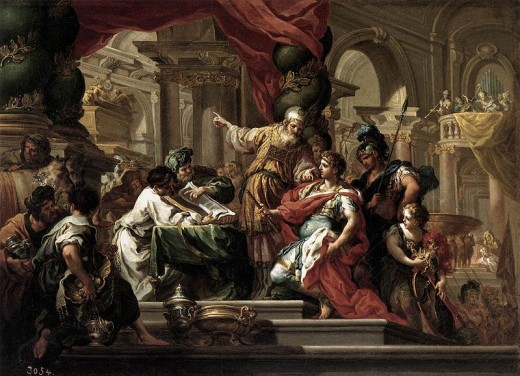
The Coming of Alexander
Even though I am a Kohen and descendant of priests, I am not foolish enough to think that means we are without blame in our history either. As Saduccees, we have committed our share of sins, most of them concerning human frailities. Chiefly amongst these was the quest for power. It was because of this ignoble pursuit that the Pharisees were able to gain a degree of popularity amongst the common people because they merely had to point an accusing finger at my ancestors and say, "See, they are no different than the aristocracy of any other nation. They care only about what they can gain for themselves and care nothing for the common people." Of course in light of what occurred at the time of the Maccabees there's probably no denying the accuracy of this statement. So what was actually a political nightmare the Pharisees managed to spin doctor into a miraculous intervention of God and proclaim it as Holy Days for the common man. Even back then the rabbis were masterful spin doctors.
But the actual events were far different than what is presented in the current version. The story began 150 years before the time of these celebrated events, when Alexander the Great marched through Israel on his way to conquer Egypt. As to be expected there are a few versions of this episode. From the Jewish perspective we have a report from Josephus and another from the Talmud. From the Greek historians we have a third which focuses and examines the events from a socio-political perspective. The Talmud will talk about dreams that Alexander experienced, where he was threatend with annihilation by an angel of God, only to find that the High Priest of the Temple was none other than the angel of his dream and he falls down at the feet of the High Priest and begs for forgiveness and swears that he will be a servant fo the one and only God for the rest of his life. Then he tells the Jews that he had been deceived by the Samaritans that have accompanied him to Jerusalem and the Jews could do whatever they wished to these sinful Samaritans. At which point the Jews fall upon the Samaritans, slaughter a great many, Alexander leaves and everybody is happy. Then again, fairy tales with happy endings are what the Talmud is all about so why should this have been treated any differently?
But for historical accuracy, most scholars will acknowledge that neither the Talmudic version nor the version by the Jewish historian Flavius Josephus in his Jewish Antiquities 11:317-345 are true. Firstly, Josephus makes reference to the Book of Daniel which historians are in agreement wasn't written yet. Secondly, the Talmud has the Samaritans asking Alexander for permission to build their temple on Mount Gerzim but in actuality, this had already been done in the time of the first Sanballat when the Jews returned under Nehemiah two hundred years earlier.
As we read from Joesphus, "And when he had said this to Parmenion, and had given the high-priest his right hand, the priests ran along by him, and he came into the city. And when he went up into the temple, he offered sacrifice to God, according to the high-priest's direction, and magnificently treated both the high-priest and the priests. And when the Book of Daniel was showed him wherein Daniel declared that one of the Greeks should destroy the empire of the Persians, he supposed that himself was the person intended. And as he was then glad, he dismissed the multitude for the present. But the next day he called them to him, and bid them ask what favors they pleased of him; whereupon the high-priest desired that they might enjoy the laws of their forefathers, and might pay no tribute on the seventh year. He granted all they desired. And when they asked him that he would permit the Jews in Babylon and Media to enjoy their own laws also, he willingly promised to do hereafter what they desired. And when he said to the multitude, that if any of them would enlist themselves in his army, on this condition, that they should continue under the laws of their forefathers, and live according to them, he was willing to take them with him, many were ready to accompany him in his wars. So when Alexander had thus settled matters at Jerusalem, he led his army into the neighboring cities; and when all the inhabitants to whom he came received him with great kindness, the Samaritans, who had then Shechem for their metropolis -a city situate at Mount Gerizzim, and inhabited by apostates of the Jewish nation- seeing that Alexander had so greatly honored the Jews, determined to profess themselves Jews as well. Accordingly, they made their address to the king with splendor, and showed great alacrity in meeting him at a little distance from Jerusalem. And when Alexander had commended them, the Shechemites approached to him, taking with them the troops that Sanballat had sent him, and they desired that he would come to their city, and do honor to their temple also; to whom he promised, that when he returned he would come to them. And when they petitioned that he would remit the tribute of the seventh year to them, because they did but sow thereon, he asked who they were that made such a petition; and when they said that they were Hebrews, but had the name of Sidonians, living at Shechem, he asked them again whether they were Jews; and when they said they were not Jews, 'It was to the Jews,' said he, 'that I granted that privilege; however, when I return, and am thoroughly informed by you of this matter, I will do what I shall think proper."
At least we have acknowledgement that the Samaritans had their own temple at the time and had hoped Alexander would do them the same honour as he did the Jews. Now we must examine carefully what this honour entailed. It involved a non-Jew, and more importantly a non-priest entering not only through the Court of Israelites, but also into the Court of the Priests, up to the sacrificial altar. And there the Macedonian King actually performed the sacrificial rite. It is also reported that he was allowed (most likely took) access into the Holy of Holies to view the ark and other contents. In essence, a violation of every prohibition of the Temple regarding the restrictions of non-Jews and non-priests. The reality is that this was a total capitulation, a fact that was most certainly addressed in the Greek writings and not in anyway the deference of Alexander to the Jews as both Josephus and the Talmud portrayed.
Now, there is another version which appears to be a hybrid of both the Jewish legends and the Greek histographer's records which does provide a somewhat different perspective but probably a more accurate one when it comes to certain details. And it is clear from this version that what occurred could have been avoided and even this incident in the Temple could have been prevented had the High Priest paid his respects to Alexander by sending him troops and supplies upon the Macedonian's initial request. This most intersting version reads as follows: "For it is written that as Alexander was besiegiing Tyre, he sent a message to the Jewish high-priest, to send him some auxiliaries, and to supply his army with provisions; and that what presents he formerly sent to Darius, he would now send to him, and choose the friendship of the Macedonians, and that he should never repent of so doing. But the high-priest answered the messengers, that he had given his oath to Darius not to bear arms against him; and he said that he would not transgress this while Darius was in the land of the living. Upon hearing this answer, Alexander was very angry; and though he determined not to leave Tyre, which was just ready to be taken, yet as soon as he had taken it, he threatened that he would make an expedition against the Jewish high-priest, and through him teach all men to whom they must keep their oaths. So when he had, with a good deal of pains during the siege, taken Tyre, and had settled its affairs, he came to the city of Gaza, and besieged both the city and him that was governor of the garrison, whose name was Babemeses.
But the Samarian leader, Sanballat thought he had now gotten a proper opportunity to make his attempt, so he renounced Darius, and taking with him seven thousand of his own subjects, he came to Alexander; and finding him beginning the siege of Tyre, he said to him, that he delivered up to him these men, who came out of places under his dominion, and did gladly accept of him for his lord instead of Darius. So when Alexander had received him kindly, Sanballat took courage, and spoke to him about his present affair. He told him that he had a son-in-law, Manasseh, who was brother to the high-priest Jaddus; and that there were many others of his own nation, now with him, that were desirous to have a temple in the places subject to him; that it would be for the king's advantage to have the strength of the Jews divided into two parts, lest when the nation is of one mind, and united, upon any attempt for innovation, it prove troublesome to kings, as it had formerly proved to the kings of Assyria. Whereupon Alexander gave Sanballat leave so to do, who used the utmost diligence, and built the temple, and made Manasseh the priest, and deemed it a great reward that his daughter's children should have that dignity; but when the seven months of the siege of Tyre were over, and the two months of the siege of Gaza, Sanballat died.
Now Alexander, when he had taken Gaza, made haste to go up to Jerusalem; and Jaddus the high-priest, when he heard that, was in an agony, and under terror, as not knowing how he should meet the Macedonians, since the king was displeased at his foregoing disobedience. He therefore ordained that the people should make supplications, and should join with him in offering sacrifice to God, whom he besought to protect that nation, and to deliver them from the perils that were coming upon them; whereupon God warned him in a dream, which came upon him after he had offered sacrifice, that he should take courage, and adorn the city, and open the gates; that the rest should appear in white garments, but that he and the priests should meet the king in the habits proper to their order, without the dread of any ill consequences, which the providence of God would prevent. Upon which, when he rose from his sleep, he greatly rejoiced, and declared to all the warning he had received from God. According to which dream he acted entirely, and so waited for the coming of the king.
And when Jaddus understood that Alexander was not far from the city, he went out in procession, with the priests and the multitude of the citizens. The procession was venerable, and the manner of it different from that of other nations. It reached to a place called Sapha, which name, translated into Greek, signifies a prospect, for you have thence a prospect both of Jerusalem and of the temple. And when the Phoenicians and the Samaritans that followed him thought they should have liberty to plunder the city, and torment the high-priest to death, which the king's displeasure fairly promised them, the very reverse of it happened; for Alexander, when he saw the multitude at a distance, in white garments, while the priests stood clothed with fine linen, and the high-priest in purple and scarlet clothing, with his mitre on his head, having the golden plate whereon the name of God was engraved, he approached by himself, and adored that name, and first saluted the high-priest."
There are several intriguing statements in this version. Firstly, that the Samaritans were already allied to the Macedonians during the seige of Tyre. Next, that the son-in-law of Sanballat was the brother of the High Priest in Jerusalem. This is a fact that is not revealed by the Rabbis in their version of Jewish history. In fact they don't refer to Manasseh at all other than an exile, but as can be seen from the genealogy which is recorded in my family this was never in dispute but it does raise numerous issues that have so far gone unnoticed. When the descendants of Sanballat are examined, it becomes very clear that the Samaritan Temple was already in operation at the time of Alexander. Sanballat I, was the same individual that Nehemiah refused to let help in the rebuilding of the Temple in Jerusalem. So instead he erected the temple on Mount Gerzim and Hiskiah, who was married to his granddaughter Delilah was High priest. Now Hiskiah was a descendant of Aaron but his status was of one of the lesser priestly families and therefore his would always be an inferior line as to that which existed in Jersualem. But contrary to the impression given in the story about Alexander, relations between Samaria and Judea were not always hostile and when Sanballat II sought to improve the bloodlines of the high priest at Mount Gerzim, he married his daughter Nicasso to Jeshua (Jesus) the son of Hilkiah, the High Priest at the Temple in Jerusalem. Of course this didn't work as planned since Jeshua was murdered by his own brother and no offspring ever were born to this marriage. The details of the murder are somewhat scanty, and the impression given is that Jeshua was intent on murdering his brother but somehow the roles became reversed. Self defense? Or something more sinister in that Jeshua was punished for his marriage to the daughter of the most powerful man in Samaria. But the Samaritans were not ones to give up that easily and when the daughter of the third Sanballat, also named Nicasso was of marriageable age, she found a husband in the High Priest Mannaseh, the brother of Jaddua, the same High Priest that opened the gates of Jerusalem to Alexander and the son of the aforementioned Jonathan (likely meaning grandson since son and grandson were often interchanged), who may or may not have been responsible for the murder of his brother Jeshua. As mentioned, the Jewish records state that Mannaseh was expelled from Jerusalem. Whether or not this was before or after the marriage is immaterial as what is important is that he became the High Priest of Samaria and his direct descendants actually officiated in Samaria up to around one hundred and fifty years ago until such time when there was no male offspring born.
What can be inferred from all this, was that when Sanballat inferred to Alexander that there were subjects that were loyal to Manasseh and would prefer to have the Temple subject to him, he may have been suggesting to install Manasseh in Jerusalem. In fact, according to the rabbinical story, they claim that the Samaritans had conived to have the Temple in Jerusalem given to them once the city was conquered. Sanballat knew this would have caused a rift in the Judean government, weakening it to a point that it would not be a threat to any ruler in the future. Most likely Sanballat saw a reunification at some point but it would be under his family that the authority would reside.
Also in this latter version of the events, there was a dream sequence but it was actually Jaddua the High Priest dreaming and not Alexander. And in this dream, Jaddua sees clearly that surrender was the only possibility available to him. Other than a salute, there is no kneeling before Jaddua that exists in the Jewish versions of the story. Adoring the name, as the last sentence states is an odd way of saying that Alexander desired to worship the God of the Jews, as the Jewish versions suggest. We do know that Jaddua swore his allegiance to Alexander and promised that all male children born in Judea at that time would be named Alexander. There is obviously an adoration of the name but it is all unidirectional.
And what of the Samaritans which according to the Jewish versions were punished at the hands of the Jews when Alexander felt betrayed by Sanballat? Even that is explained differently in this version of the story. Accordingly it states, "And in this manner he took leave of the Shechemites; but ordered that the troops of Sanballat should follow him into Egypt, because there he designed to give them lands, which he did a little after in Thesis, when he ordered them to guard that country." It would appear that the Samaritans were well rewarded for their loyalty after all, they just weren't given Jerusalem. As for the Jews, Jaddua had to promise to provide men to fight in Alexander's army. He had to provide provisions and materials. He had to permit the establishment of Greek cities within the borders of Judea and most importantly, they had to learn Greek which was to be the new common language within the empire. Essentially, Jaddua had to agree to the Hellenization of the Jews which set the stage for what was to follow at the time of the Maccabees.
Relationship of Jerusalem Priesthood with Sanballat and Tobiads
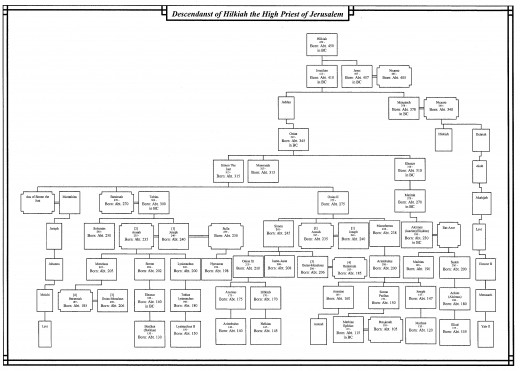
Descendants of Sanballat
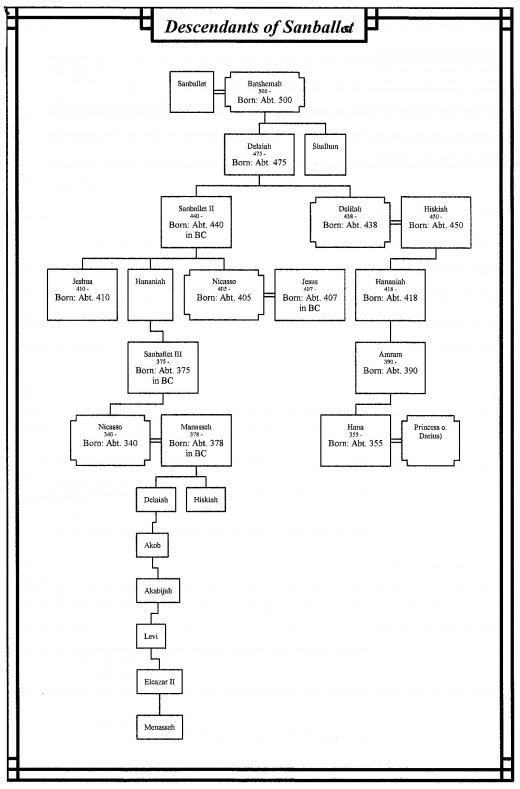
Civil War In Judea
The war of liberation, this misnamed war of religious freedom, was nothing more than a political dogfight between several brothers within all the camps over several generations. In fact, the term Civil War is far more appropriate and one that we can all appreciate. It is just one more reason that the Chanukah that I celebrate has nothing to do with a religious event but more to do with a rememberance of what we as a people stand for even if at times it is misguided by those that sit in positions of power above us.
To understand the Maccabean war it is essential that one appreciates the history. In this respect, none was better in presenting the actual events than Flavius Josephus. Born just two hundred years later, he was well indoctrinated with what actually occurred and because he had access to the Roman archives, he was able to provide a perspective that was only available to those that were actually funding and supplying the war effort of the Jews. Here's how Josephus describes the War of Chanukah; My Comments are in capital LETTERS: .
1. AT the same time that Antiochus, who was called Epiphanes, had a quarrel with the sixth Ptolemy about his right to the whole country of Syria, a great sedition fell among the men of power in Judea, and they had a contention about obtaining the government; while each of those that were of dignity could not endure to be subject to their equals. (A CONFRONTATION BETWEEN THE MEMBERS OF THE JUDEAN ARISTOCRACY IS BREWING) However, Onias, one of the high priests, got the better, and cast the sons of Tobias out of the city; who fled to Antiochus, and besought him to make use of them for his leaders, and to make an expedition into Judea. (THE TOBIADS WERE A PROMINENT SAMARITAN/JUDEAN FAMILY RELATED TO THE SANBALLATS AND TO THE HIGH PRIESTS OF JERUSALEM. THE FACT THAT THEY WERE CONSIDERED PROMINENT IN BOTH PROVINCES INDICATES THE INFLUENCE OF SAMARITANS ON THE JUDEAN HIGH PRIESTHOOD BESIDES JUST INTERMARRIAGE. THE TOBIAD FAMILY TREE SHOWS THE EXTENT OF THIS INFLUENCE AS CAN BE SEEN IN THE DESCENDANTS OF HILKIAH GENEALOGY) The king being thereto disposed beforehand, complied with them, and came upon the Jews with a great army, and took their city by force, and slew a great multitude of those that favored Ptolemy, and sent out his soldiers to plunder them without mercy. He also spoiled the temple, and put a stop to the constant practice of offering a daily sacrifice of expiation for three years and six months. But Onias, the high priest, fled to Ptolemy, and received a place from him in the Nomus of Heliopolis, where he built a city resembling Jerusalem, and a temple that was like its temple concerning which we shall speak more in its proper place hereafter. (THE SELEUKIDS OF SYRIA WERE IN POSSESSION OF JUDEA SINCE 198BC OR THIRTY YEARS ALREADY. BY CONSPIRING WITH PTOLEMY, ONIAS WAS IN EFFECT PLOTTING AGAINST THE SELEUKID KING. THE TOBIADS WERE ACTUALLY SERVING THE KING THAT RULED OVER THEIR COUNTRY AT THE TIME. ONIAS-MENELAUS SHOWN ON THE TREE IS THE ACCURSED MENELAUS OF THE MACCABEAN STORY. JOINED TO THE TOBIADS THROUGH MARRIAGE, HE WAS ACTUALLY A HIGH PRIEST LOYAL TO HIS SELEUKID MASTERS. HIS BROTHER ONIAS III FLED TO EGYPT AS SOON AS HIS PLOTTING WITH PTOLEMY WAS REPORTED AND BROTHER JASON NOW FILLED THE POSITION OF HIGH PRIEST. JASON WAS A CONCILITATOR TRYING TO MAKE AMENDS WITH ANTIOCHUS BUT ONIAS III WAS ALREADY IN THE PROCESS OF BUILDING ANOTHER TEMPLE IN EGYPT THAT WOULD SERVE JEWISH EXILES. THIS ONLY MADE ANTIOCHUS MORE SUSPICIOUS OF JASON'S MOTIVES.)
2. Now Antiochus was not satisfied either with his unexpected taking the city, or with its pillage, or with the great slaughter he had made there; but being overcome with his violent passions, and remembering what he had suffered during the siege, he compelled the Jews to dissolve the laws of their country, and to keep their infants uncircumcised, and to sacrifice swine's flesh upon the altar; against which they all opposed themselves, and the most approved among them were put to death. Bacchides also, who was sent to keep the fortresses, having these wicked commands, joined to his own natural barbarity, indulged all sorts of the extremest wickedness, and tormented the worthiest of the inhabitants, man by man, and threatened their city every day with open destruction, till at length he provoked the poor sufferers by the extremity of his wicked doings to avenge themselves. (JASON OPENED THE CITY TO ANTIOCHUS HOPING TO STAVE OFF ANY PUNISHMENT BY ANTIOCHUS EPIPHANES: IT FAILED. HE WAS BANISHED AND BROTHER MENELAUS WAS PUT IN HIS STEAD. JOSEPHUS HAS TELESCOPED A CONSIDERABLE TIME PERIOD INTO WHAT SOUNDS LIKE A SINGLE DAY. THE BATTLES BETWEEN JASON'S MEN AND THOSE OF HIS BROTHER MENELAUS ARE WHAT LED TO THE INTENSIFYING OF EDICTS AGAINST THE JEW AS ANTIOCHUS DECIDED HE WOULD TOLERATE NO MORE AND WOULD BREAK THE BACKS OF THE RESISTANCE.)
3. Accordingly Matthias, the son of Asamoneus, one of the priests who lived in a village called Modin, armed himself, together with his own family, which had five sons of his in it, and slew Bacchides with daggers; and thereupon, out of the fear of the many garrisons [of the enemy], he fled to the mountains; and so many of the people followed him, that he was encouraged to come down from the mountains, and to give battle to Antiochus's generals, when he beat them, and drove them out of Judea. So he came to the government by this his success, and became the prince of his own people by their own free consent, and then died, leaving the government to Judas, his eldest son. (THE ASMONEANS WERE FROM A LESSER PRIESTLY FAMILY. IN FACT LOOKING AT THEIR FAMILY TREE, THEY WERE QUITE DISTANT, HAVING BEEN REMOVED FROM THE MAIN LINE OF PRIESTS BY SEVERAL HUNDRED YEARS BUT SINCE THERE WAS ALREADY CIVIL WAR AMONGST THE PRIESTS, THEY FELT THEY DESERVED TO INHERIT THE POSITION AS MUCH AS ANYONE ELSE. THE RULE HAD BECOME, "TAKE WHAT YOU CAN BY FORCE" AND THE ASMONEANS WERE FIGHTERS, A VERY UNCHARASTERISTIC ABILITY OF PRIESTS ESPECIALLY SINCE THEY WERE NOT ADVERSE TO HAVE BLOOD ON THEIR HANDS.)
4. Now Judas, supposing that Antiochus would not lie still, gathered an army out of his own countrymen, and was the first that made a league of friendship with the Romans, and drove Epiphanes out of the country when he had made a second expedition into it, and this by giving him a great defeat there; and when he was warmed by this great success, he made an assault upon the garrison that was in the city, for it had not been cut off hitherto; so he ejected them out of the upper city, and drove the soldiers into the lower, which part of the city was called the Citadel. He then got the temple under his power, and cleansed the whole place, and walled it round about, and made new vessels for sacred ministrations, and brought them into the temple, because the former vessels had been profaned. He also built another altar, and began to offer the sacrifices; and when the city had already received its sacred constitution again, Antiochus died; whose son Antiochus succeeded him in the kingdom, and in his hatred to the Jews also. (THE MOST IMPORTANT LINE IS THE ALLIANCE BETWEEN JUDAH MACCABEE AND ROME. NOW HE HAD SUPPORT, LOGISTICALLY, FINANCIALLY AND IN ARMS. ANTIOCHUS EPIPHANES, WHO HAD BEEN A CAPTIVE IN ROME MOST OF HIS YOUTHFUL LIFE KNEW THAT IT MEANT EITHER TOTAL CONQUEST OF JUDEA OR ELSE ROME WOULD HAVE A BEACH-HEAD INTO HIS KINGDOM FROM WHICH TO LAUNCH FUTURE ATTACKS. JUDAH MACCABEE HAD OPENED THE DOOR TO THE GREATER DANGER AS THE DESTRUCTION OF JERUSALEM AND THE TEMPLE 230 YEARS LATER BY THE ROMANS WOULD ATTEST TO.)
5. So this Antiochus got together fifty thousand footmen, and five thousand horsemen, and fourscore elephants, and marched through Judea into the mountainous parts. He then took Bethsura, which was a small city; but at a place called Bethzacharis, where the passage was narrow, Judas met him with his army. However, before the forces joined battle, Judas's brother Eleazar, seeing the very highest of the elephants adorned with a large tower, and with military trappings of gold to guard him, and supposing that Antiochus himself was upon him, he ran a great way before his own army, and cutting his way through the enemy's troops, he got up to the elephant; yet could he not reach him who seemed to be the king, by reason of his being so high; but still he ran his weapon into the belly of the beast, and brought him down upon himself, and was crushed to death, having done no more than attempted great things, and showed that he preferred glory before life. Now he that governed the elephant was but a private man; and had he proved to be Antiochus, Eleazar had performed nothing more by this bold stroke than that it might appear he chose to die, when he had the bare hope of thereby doing a glorious action; nay, this disappointment proved an omen to his brother [Judas] how the entire battle would end. It is true that the Jews fought it out bravely for a long time, but the king's forces, being superior in number, and having fortune on their side, obtained the victory. And when a great many of his men were slain, Judas took the rest with him, and fled to the toparchy of Gophna. So Antiochus went to Jerusalem, and staid there but a few days, for he wanted provisions, and so he went his way. He left indeed a garrison behind him, such as he thought sufficient to keep the place, but drew the rest of his army off, to take their winter-quarters in Syria. (THIS IS NOT THE STORY THAT IS PRESENTED BY THE RABBIS. HERE, THE MACCABEES HAVE LOST JERUSALEM ONCE MORE. AFTER THE REDEDICATION OF THE TEMPLE, IT IS NOW IN THE HANDS OF THE SELEUKIDS AGAIN. BUT ANTIOCHUS HAS TO HEAD BACK EAST BECAUSE OF A REVOLT IN MEDES AND THE ATTACK OF MITHRADITES. THE TIMING OF THIS ATTACK WAS MORE A MIRACLE THAN THE REDEDICATION OF THE TEMPLE WHICH WAS ONLY TEMPORARY AT BEST. OF COURSE IF YOU WERE MITHRADITES THIS WAS SIMPLY STRATEGIC, ATTACKING YOUR ENEMIES WHILE THEIR INVOLVED ELSEWHERE AND HAD NOTHING TO DO WITH DIVINE INTERVENTION.)
6. Now, after the king was departed, Judas was not idle; for as many of his own nation came to him, so did he gather those that had escaped out of the battle together, and gave battle again to Antiochus's generals at a village called Adasa; and being too hard for his enemies in the battle, and killing a great number of them, he was at last himself slain also. Nor was it many days afterward that his brother John had a plot laid against him by Antiochus's party, and was slain by them. (ANOTHER SUPRISE THAT THE EXISTING CHANUKAH STORY FAILS TO TELL. JUDAH'S ARMY IS DECIMATED AND HIS BROTHER JOHN IS KILLED BY THE JEWISH SUPPORTERS OF ANTIOCHUS. THE CIVIL WAR IS STILL RAGING EVEN THOUGH THE SELEUKID ARMY IS GONE. FOR THIS ACT TO HAVE BEEN COMMITTED WOULD HAVE MEANT THAT A GOOD PROPORTION OF THE JEWS ARE ANTI-MACCABEE.)
CHAPTER 2:1. WHEN Jonathan, who was Judas's brother, succeeded him, he behaved himself with great circumspection in other respects, with relation to his own people; and he corroborated his authority by preserving his friendship with the Romans. He also made a league with Antiochus the son. Yet was not all this sufficient for his security; for the tyrant Trypho, who was guardian to Antiochus's son, laid a plot against him; and besides that, endeavored to take off his friends, and caught Jonathan by a wile, as he was going to Ptolemais to Antiochus, with a few persons in his company, and put him in bonds, and then made an expedition against the Jews; but when he was afterward driven away by Simon, who was Jonathan's brother, and was enraged at his defeat, he put Jonathan to death. (WE KNOW THAT ANTIOCHUS EPIPHANES DIED FROM ILLNESS WHILE HE WARRED AGAINST MITHRADITES IN THE EAST. HIS YOUNG SON ALSO NAMED ANTIOCHUS EUPATOR TOOK OVER BUT HE WAS ONLY A CHILD OF AROUND 9 YEARS AND HAD A REGENT RULING. BUT JONATHAN HAD DOUBLE DEALT THE ROMANS, MAKING HIS OWN PEACE PACT WITH ANTIOCHUS EPIPHANES BEFORE HE HAD DIED. THEORETICALLY, THE WAR WAS OVER AND JUDEA AT PEACE, BUT THE REGENT WAS NOT WILLING TO ACCEPT THE TERMS AND CAPTURED JONATHAN WHEN HE WAS NEGOTIATING MORE TRUCES IN GAULANTIA TO THE NORTH. SIMON TRIED TO COME TO THE RESCUE OF HIS BROTHER, BUT TRYPHO KILLED JONATHAN BEFORE HE RETREATED.)
2. However, Simon managed the public affairs after a courageous manner, and took Gazara, and Joppa, and Jamnia, which were cities in his neighborhood. He also got the garrison under, and demolished the citadel. He was afterward an auxiliary to Antiochus, against Trypho, whom he besieged in Dora, before he went on his expedition against the Medes; yet could not he make the king ashamed of his ambition, though he had assisted him in killing Trypho; for it was not long ere Antiochus sent Cendebeus his general with an army to lay waste Judea, and to subdue Simon; yet he, though he was now in years, conducted the war as if he were a much younger man. He also sent his sons with a band of strong men against Antiochus, while he took part of the army himself with him, and fell upon him from another quarter. He also laid a great many men in ambush in many places of the mountains, and was superior in all his attacks upon them; and when he had been conqueror after so glorious a manner, he was made high priest, and also freed the Jews from the dominion of the Macedonians, after one hundred and seventy years of the empire [of Seleucus]. (IN CASE ONE THINKS THEY MISREAD THIS, THEY HAVEN'T. THE YOUNG ANTIOCHUS EUPATOR BREAKS AWAY FROM THE CONTROL OF HIS REGENT, TRYPHO. HE SEALS A SEPARATE PEACE AGREEMENT WITH SIMON AND THEN HAS SIMON JOIN HIS ARMY TO DEFEAT TRYPHO. SIMON KILLS TRYPHO BUT IS ODDLY TURNED ON BY THE YOUNG KING. SIMON FIGHTS A GUERILLA STYLE WAR AND DEFEATS ANTIOCHUS EUPATOR. THEN SIMON DOES THE UNTHINKABLE, HE HAS HIMSELF PROCLAIMED AS HIGH PRIEST EVEN THOUGH HIS FAMILY WAS NOT IN LINE FOR THE POSITION.)
3. This Simon also had a plot laid against him, and was slain at a feast by his son-in-law Ptolemy, who put his wife and two sons into prison, and sent some persons to kill John, who was also called Hyrcanus. But when the young man was informed of their coming beforehand, he made haste to get to the city, as having a very great confidence in the people there, both on account of the memory of the glorious actions of his father, and of the hatred they could not but bear to the injustice of Ptolemy. Ptolemy also made an attempt to get into the city by another gate; but was repelled by the people, who had just then admitted of Hyrcanus; so he retired presently to one of the fortresses that were about Jericho, which was called Dagon. Now when Hyrcanus had received the high priesthood, which his father had held before, and had offered sacrifice to God, he made great haste to attack Ptolemy, that he might afford relief to his mother and brethren. (THE POLITICS OF DECEIT. AS CAN BE SEEN FROM THE GENEALOGY OF THE ASMONEANS, THIS PTOLEMY WAS NONE OTHER THAN PTOLEMY PHYSICON, THE KING OF EGYPT. SIMON WHILE MAKING A PACT WITH ANTIOCHUS EUPATOR HAD DOUBLE CROSSED HIM BY ALLYING HIMSELF WITH EGYPT. IT IS NO WONDER THAT ANTIOCHUS EUPATOR WENT TO WAR AGAINST SIMON AFTER INITIALLY HAVING A TREATY. IT WOULD APPEAR THE MACCABEES WERE CONSTANTLY BETRAYING THEIR ALLIES.)
4. So he laid siege to the fortress, and was superior to Ptolemy in other respects, but was overcome by him as to the just affection [he had for his relations]; for when Ptolemy was distressed, he brought forth his mother, and his brethren, and set them upon the wall, and beat them with rods in every body's sight, and threatened, that unless he would go away immediately, he would throw them down headlong; at which sight Hyrcanus's commiseration and concern were too hard for his anger. But his mother was not dismayed, neither at the stripes she received, nor at the death with which she was threatened; but stretched out her hands, and prayed her son not to be moved with the injuries that she suffered to spare the wretch; since it was to her better to die by the means of Ptolemy, than to live ever so long, provided he might be punished for the injuries he done to their family. Now John's case was this: When he considered the courage of his mother, and heard her entreaty, he set about his attacks; but when he saw her beaten, and torn to pieces with the stripes, he grew feeble, and was entirely overcome by his affections. And as the siege was delayed by this means, the year of rest came on, upon which the Jews rest every seventh year as they do on every seventh day. On this year, therefore, Ptolemy was freed from being besieged, and slew the brethren of John, with their mother, and fled to Zeno, who was also called Cotylas, who was tyrant of Philadelphia. (THE LIKELIHOOD OF JOHN HYRCANUS DEFEATING PTOLEMY WAS REMOTE. THE STORY CLEVERLY TELLS US THAT PTOLEMY HAD STRATEGIC ADVANTAGE. JUST WHAT IS MEANT BY 'HYRACANUS WAS SUPERIOR IN OTHER RESPECTS' IS NOT EXACTLY KNOWN. THE FACT IS THAT HE FAILED TO TAKE THE CITY OR PTOLEMY AND THE SABBATICAL YEAR PROVIDES AN OFFICIAL EXCUSE FOR WHY HE WAS UNABLE TO SAVE HIS MOTHER AND FAMILY.)
5. And now Antiochus was so angry at what he had suffered from Simon, that he made an expedition into Judea, and sat down before Jerusalem and besieged Hyrcanus; but Hyrcanus opened the sepulcher of David, who was the richest of all kings, and took thence about three thousand talents in money, and induced Antiochus, by the promise of three thousand talents, to raise the siege. Moreover, he was the first of the Jews that had money enough, and began to hire foreign auxiliaries also. (ONCE AGAIN THE MACABEES SWING BACK AND FORTH AS TO WHOM THEY GIVE THEIR ALLEGIANCE. THIS TIME IT IS WITH THE SELEUKIDS, AND THE PEACE IS PURCHASED THROUGH TRIBUTE AS JOHN DECLARES JUDEA AS NOTHING MORE THAN A VASSAL STATE OF THAT EMPIRE.)
6. However, at another time, when Antiochus was gone upon an expedition against the Medes, and so gave Hyrcanus an opportunity of being revenged upon him, he immediately made an attack upon the cities of Syria, as thinking, what proved to be the case with them, that he should find them empty of god troops. So he took Medaba and Samea, with the towns in their neighborhood, as also Shechem, and Gerizzim; and besides these, [he subdued] the nation of the Cutheans, who dwelt round about that temple which was built in imitation of the temple at Jerusalem; he also took a great many other cities of Idumea, with Adoreon and Marissa. (IT WOULD APPEAR THAT THE SABBATICAL YEAR WAS NO LONGER IN EFFECT. THE IMMOBILIZATION THAT HAD PARALYZED ANY ACTION FROM SAVING HIS FAMILY WAS ELIMINATED AS SOON AS ANTIOCHUS WAS FAR OFF IN THE EAST. HAVING THE MACCABEES AS AN ALLY WAS LIKE SLEEPING WITH A VIPER. YOU NEVER KNEW WHEN THEY WERE GOING TO BITE THE HAND OF THEIR MASTER.)
7. He also proceeded as far as Samaria, where is now the city Sebaste, which was built by Herod the king, and encompassed it all round with a wall, and set his sons, Aristobulus and Antigonus, over the siege; who pushed it on so hard, that a famine so far prevailed within the city, that they were forced to eat what never was esteemed food. They also invited Antiochus, who was called Cyzicenus, to come to their assistance; whereupon he got ready, and complied with their invitation, but was beaten by Aristobulus and Antigonus; and indeed he was pursued as far as Scythopolis by these brethren, and fled away from them. So they returned back to Samaria, and shut the multitude again within the wall; and when they had taken the city, they demolished it, and made slaves of its inhabitants. And as they had still great success in their undertakings, they did not suffer their zeal to cool, but marched with an army as far as Scythopolis, and made an incursion upon it, and laid waste all the country that lay within Mount Carmel. (WE SEE HOW THE SO-CALLED WAR OF INDEPENDENCE HAS BECOME A WAR OF CONQUEST, INCLUDING TAKING SLAVES AND EXPANDING THE WAR FAR BEYOND THE BOARDERS OF JUDEA.)
8. But then these successes of John and of his sons made them be envied, and occasioned a sedition in the country; and many there were who got together, and would not be at rest till they brake out into open war, in which war they were beaten. So John lived the rest of his life very happily, and administered the government after a most extraordinary manner, and this for thirty-three entire years together. He died, leaving five sons behind him. He was certainly a very happy man, and afforded no occasion to have any complaint made of fortune on his account. He it was who alone had three of the most desirable things in the world, - the government of his nation, and the high priesthood, and the gift of prophecy. For the Deity conversed with him, and he was not ignorant of any thing that was to come afterward; insomuch that he foresaw and foretold that his two eldest sons would not continue masters of the government; and it will highly deserve our narration to describe their catastrophe, and how far inferior these men were to their father in felicity. (THOUGH NOT OFFICIALLY KING, JOHN HYRCANUS LEFT IT TO HIS SONS TO PROCLAIM THEMSELVES SO. NOT ENTITLED TO THE HIGH PREISTHOOD, THEY CERTAINLY WEREN'T ENTITLED TO BE KINGS EITHER, NOT BEING THE ANOINTED OF GOD. WHAT STARTED AS INFIGHTING WITHIN FAMILIES RESULTING IN CIVIL WAR, IS STILL NOTHING MORE THAN FAMILY FEUDS DIVIDING A NATION. AS JOSEPH COMMENTS, THESE WERE INFERIOR MEN.)
The Asmonean Family (Maccabees)
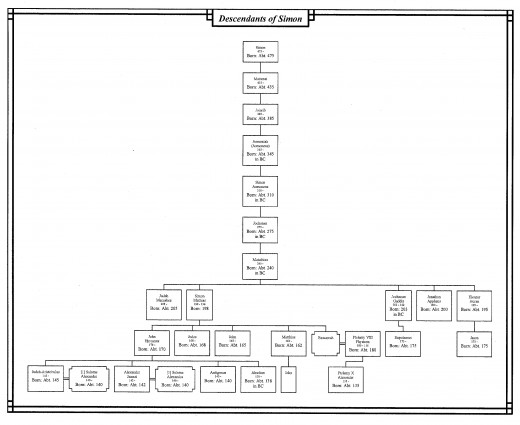
In Conclusion
What can be said now that the facts have been presented? Miracle? Hardly. If anything, the festival commemorates a series of disasters brought about by the pursuit of power. Freedom? Once again, the facts show that there never was true independence, only the political manipulations of trading one king for another until one family in Judea could actually place a crown on their own heads and convince everyone that they were better off for it. And as a result of this manoevering, death was invited into the land in the form of the Romans who would cause our greatest disaster in just over two centuries later. Recall that when Alexander the Great first arrived at Jerusalem, he achieved exactly what he demanded. That his Macedonian Empire be treated exactly in the same way that the Jews had treated their Persian masters. He received men for his army, he received tribute, but more than the Persians had ever done, he forced the Jews to adopt Greek as the Lingua Franca and he set up Greek cities within Judea. But most importantly, he showed the Jews that he, as the son of Zeus, he considered himself the equal of the Jewish God by not only sacrificing on the Temple altar but entering into the Holy of Holies to meet our God face to face. Everything that happened subsequently to that even was predestined to happen the moment Jaddua permitted Alexander to venture deep into the Temple. Two cultures that were doomed to clash violently. So when you celebrate Chanukah, thinking that it's in some way a miracle of salvation, think again. The real miracle is that after all these men from our own people finished playing their political games and fulfilling their personal agendas, that we still survived their efforts. I will commemorate the festival, but not as a Holy Day and certainly not as a commandement to do so ordained by God. But as a memorial to all those that perished because a few men pursued that which wasn't theirs. I will rededicate the memories of those lost and hail them in the strength of their beliefs even if they had been misled as to the achievements. They will be a beacon to all of us that all men must still do what is right even if in the end there are still evil men that still control our destinies. To the human spirit and the dream of freedom I will raise my cup of wine and toast them.
